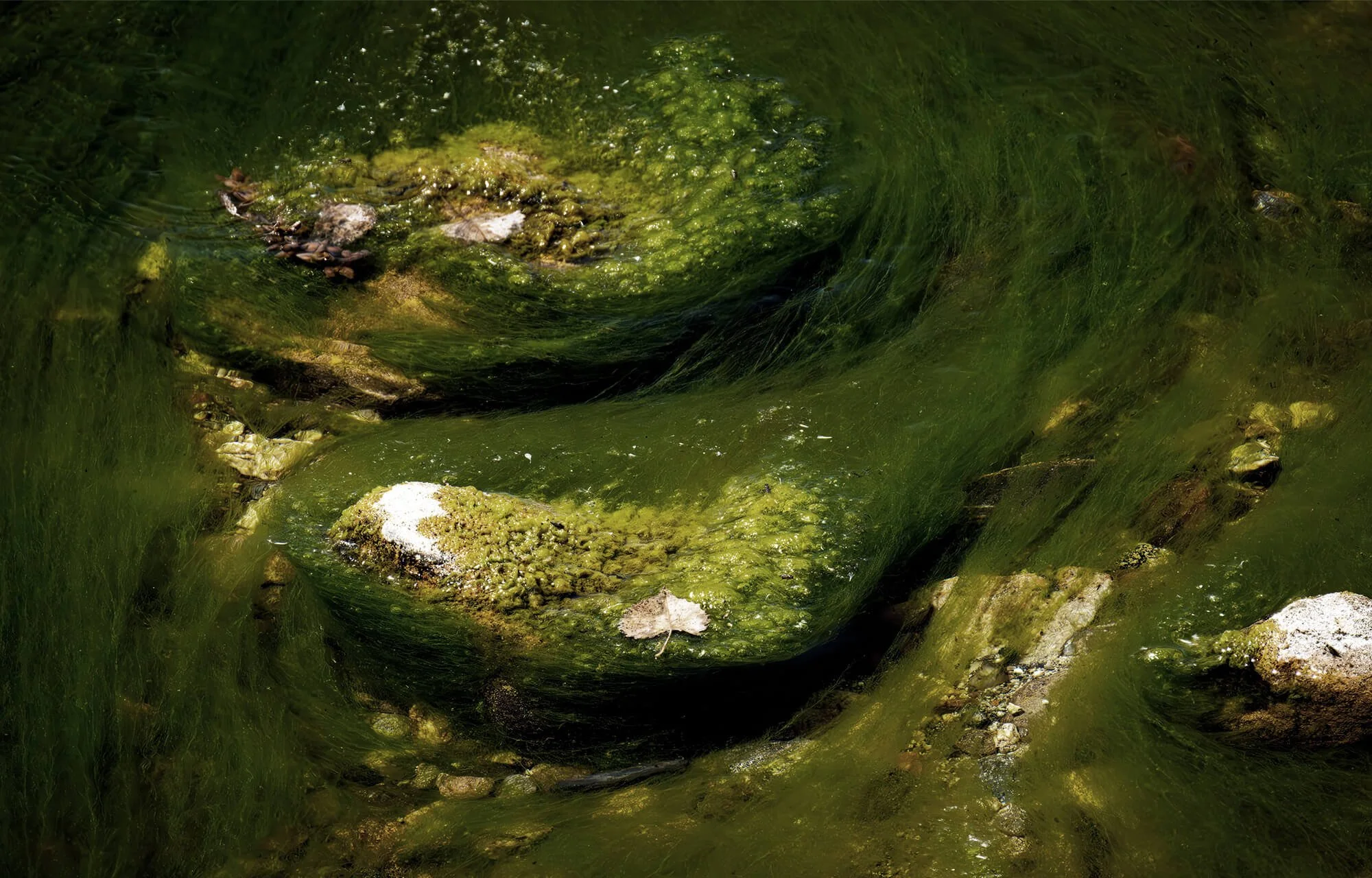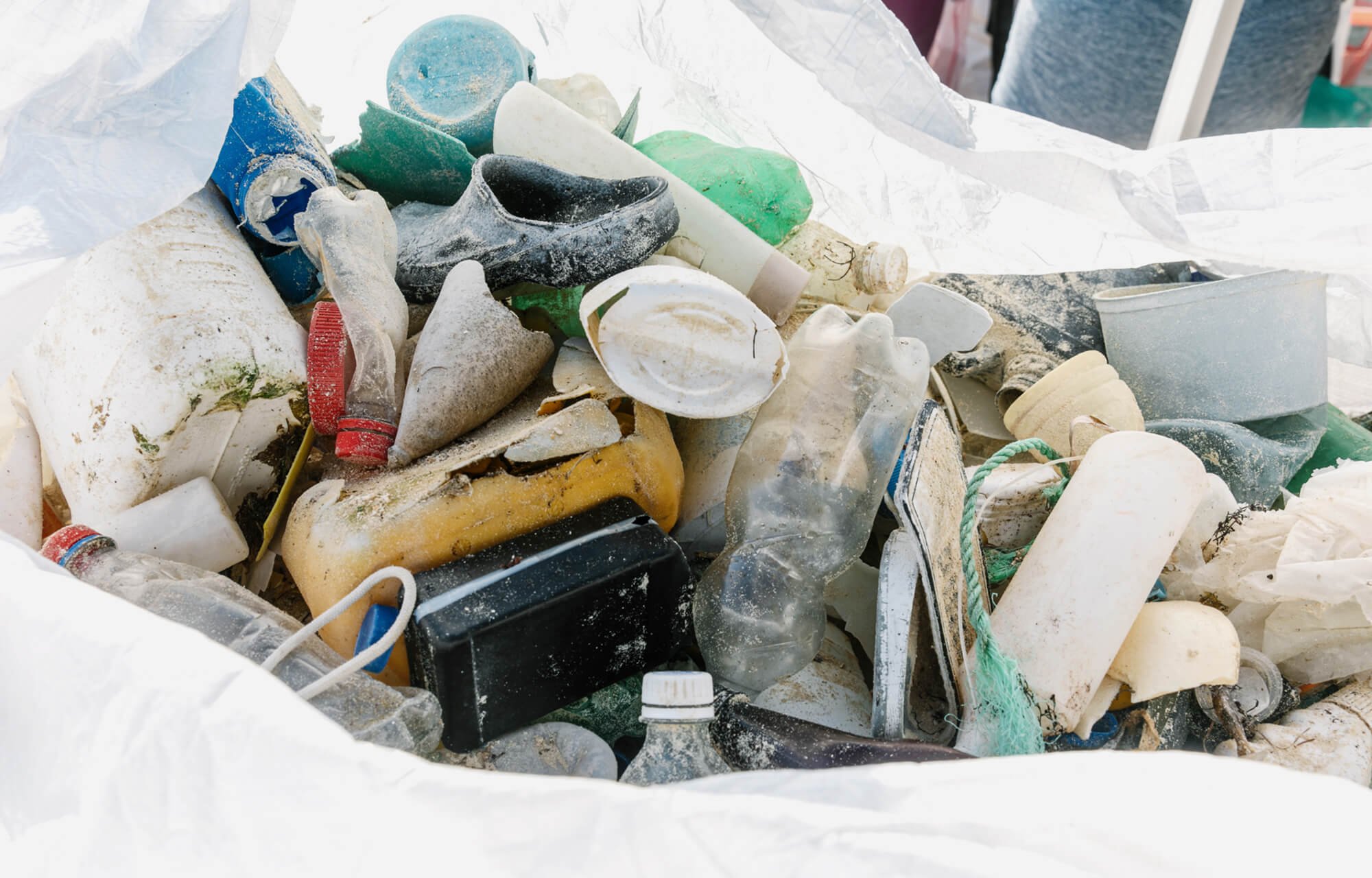Parley Ecopoetry Series: Words to Celebrate the Earth
Earth Month and National Poetry Month coexist on a calendar page, which makes perfect sense. Throughout April, Parley and Atmos teamed up to share ecopoetry honoring the natural world and the human experience within it.
This image by Alex Jinich. Header image by NASA
—
Iain Haley Pollock is the author of two poetry collections, Ghost, Like a Place (Alice James Books, 2018), which was nominated for an NAACP Image Award, and Spit Back a Boy, winner of the 2010 Cave Canem Poetry Prize.
“Artifacts” by Iian Halley Pollock
After a Saturday in cleaned-up Chelsea galleries
and a bookstore—Naomi alone upriver
with the boys—Mid-town’s proud,
sun-blotting canyons ebb behind me,
their ridges turned to skyline. The train I’m riding,
a local, makes every stop & parallels
a Hudson swollen by days of rain.
North of Greystone, we flash by two heron,
balanced on an obsolete pier’s moldering pilings,
patient for yellow perch to show
near the surface. Across the river from the birds,
on the Jersey side, the Palisades’s basalt cliffs
stand like the triumphant walls that a megalomaniac king
spent all the population of his dominion
to build. In places these tracks come within feet
of the brackish, high-tide Hudson:
I’ve often wondered how long before a flood
or the water’s steady, cyclic rise erodes
the ballast bed & sinks the rails to artifacts.
Just below Tarrytown, where as with all stations
we won’t stay long, the old Tappan Zee
looms into view, untethered now from either shore,
split in two, a middle span already torn down.
Beyond here, the Palisades look less a fortress
& more a Leviathan throwing itself skyward
to crash down onto the ship hunting it.
At home, I’ll color pages or throw a ball
or wrestle with my sons & then cook dinner
with Naomi. We’ll eat & talk & hear the stories
of our days. After the boys are in bed, I’ll step
onto the porch, & in spring’s long, thawing light,
I’ll look down a hill cut by water
coursing in time to where the high school,
its Gothic Revival brick, will block my view of the valley,
& I will not be able to see as far
as the river, will not be able to see as far as other side,
where cliffs rise out of the water, igneous & hard.
Igneous & hard. Though I have tried,
I cannot make this world
into what I want it to be.
—
Ellen Bass is a Chancellor of the Academy of American Poets and the author of nine poetry collections, the most recent of which is Indigo (Copper Canyon Press, 2020). Her work appears in the climate anthology All We Can Save.
Image by Jeferson Pereira and Danilo Rodrigues
“God of Roots” by Ellen Bass
Meanwhile, the heat and light
of a flaming star rush
93 million miles to reach us,
baby girls are born
with their four hundred thousand
egg cells already formed, otters
keep grooming their guard hair, whirling
the water, working air into the deep
underfur, beluga whales swim
along the earth’s magnetic field,
chicks pip a circle of holes counterclockwise
around the blunt end of their eggs,
pressing with their feet and
heaving with their shoulders,
larvae eat their way through the soft
mesophyll of oak leaves, leaving a trail
of dark feces in their wake, tart juice
swells within the rinds of lemons,
and under the earth the god of roots
goes on painting the lustrous fringe
with a brush so delicate—
only one sable hair—as though
there were all the time in the world.
—
Marie Howe is the author of four volumes of poetry: Magdalene: Poems (W.W. Norton, 2017); The Kingdom of Ordinary Time (W.W. Norton, 2009); What the Living Do (1997); and The Good Thief (1988). She is also the co-editor of a book of essays, In the Company of My Solitude: American Writing from the AIDS Pandemic (1994).
Image by NASA
“The Singularity” by Marie Howe
(after Stephen Hawking)
Do you sometimes want to wake up to the singularity
we once were?
so compact nobody
needed a bed, or food or money—
nobody hiding in the school bathroom
or home alone
pulling open the drawer
where the pills are kept.
For every atom belonging to me as good
Belongs to you. Remember?
There was no Nature. No
them. No tests
to determine if the elephant
grieves her calf or if
the coral reef feels pain. Trashed
oceans don’t speak English or Farsi or French;
would that we could wake up to what we were
—when we were ocean and before that
to when sky was earth, and animal was energy, and rock was
liquid and stars were space and space was not
at all—nothing
before we came to believe humans were so important
before this awful loneliness.
Can molecules recall it?
what once was? before anything happened?
No I, no We, no one. No was
No verb no noun
only a tiny tiny dot brimming with
is is is is is
All everything home
—
Alicia Ostriker is the author of sixteen poetry collections, most recently, Waiting for the Light (University of Pittsburgh Press, 2017), which received the 2017 Berru Award in Memory of Ruth and Bernie Weinflash from the Jewish Book Council.
Image by Oscar Fredes
“The City Crocuses” by Alicia Ostriker
Up they come—the yellow ones
fierce as fighters and the purples shy and tender
wind funneling up from the river
blasts me in face and throat, winter gone,
and there’s more, the walk to the subway today
made me smile
because others were smiling
secretly to themselves, a few caught my eye
and said something grateful
about winter being over—
soon along Riverside Drive daffodils lilacs cherry
but for now the tiny snowdrops alyssum crocus
decide to stop waiting
they flex their little legs, they push
and divide the dirt and up they swim
—
Vijay Seshadri’s poetry collections include 3 Sections (Graywolf Press, 2013), which won the Pulitzer Prize for Poetry; The Long Meadow (Graywolf Press, 2004), which won the James Laughlin Award; and Wild Kingdom (1996). He currently directs the graduate non-fiction writing program at Sarah Lawrence College.
Image by Lars Borges
“The Estuary” by Vijay Seshadri
The brown bear living near the estuary,
and wading out when the tide swells and the salmon run,
during the days of the dwindling salmon runs,
and slapping with his big right paw a hook-nosed fish
whipsawing inland to spawn,
the ambidextrous bear,
furred like the forest from which he emerged,
waddling into the unteachable waters
to swat the salmon out the fast-running tide
and catch the red salmon in his mouth
and toss and juggle the sockeye salmon
thrashing and drowning in the air—
and when he’s expressed himself completely
he catches with his jaw the self
that swam ten thousand miles to the estuary
and daintily, mincingly, with one paw grasping
the caudal fin and the other the head,
eats that salmon as if he were we
and the fish an ear of boiled corn—
that bear is a bear about whom rich and complicated
feelings can be felt. That is a bear from whom ideas
about the state of nature can be derived.
Cruelty is the wrong word to describe
the pleasure he gets from playing with his lunch.
Play and life are the same thing to him,
art and life, life and death.
Creation impinging on a consciousness
clear and crystalline. Pinpoint revelatory
explosions unsoiled by words, unbesmirched.
Creation clambering out of the waters,
shaking itself off, creation
surrounding itself with itself . . .
Stay down on the pavement where you just fell in a heap
like a bag of laundry, just stay there. Move even a
little and you might damage something else.
You’ve already done plenty of damage.
Stay down, supine. Stay down,
and let the giant buildings loom over you, let them
in their abstract imperium stun you with their indifference.
Wasn’t that the reason you built them in the first place?
Stay down, stay down, and ask yourself:
“Could I be the bear in this fable?”
“Could I be the fish?”
“Could I be whoever is imagining all this?”
—
Sally Bliumis-Dunn teaches Modern Poetry at Manhattanville College and the Palm Beach Poetry Festival. Her third collection, ECHOLOCATION was published by Plume editions/MadHat Press in March, 2018. “Echolocation” was long-listed for the Julie Suk Award and was a finalist for the Eric Hoffer Award.
Image by Christian Miller
“Echolocation” by Sally Bliumis-Dunn
The whales can’t hear each other calling
in the noise-cluttered sea: they beach themselves.
I saw one once— heaved onto the sand with kelp
stuck to its blue-gray skin.
Heavy and immobile
it lay like a great sadness.
And it was hard to breathe with all the stink.
Its elliptical black eyes had stilled, were mostly dry,
and barnacles clustered on its back
like tiny brown volcanoes.
Imagining the other whales, their roving weight,
their blue-black webbing of the deep,
I stopped knowing how to measure my own grief.
And this one, large and dead on the sand
with its unimaginable five-hundred-pound heart.
—
Catherine Pierce is the author of The Tornado Is the World (Saturnalia, 2016); The Girls of Peculiar (Saturnalia, 2012), which won the Mississippi Institute of Arts and Letters Poetry Prize; and Famous Last Words (Saturnalia, 2008), winner of the Saturnalia Books Poetry Prize.
Image by Naiara Altuna
“What I Want to Believe About the Vireos”
by Catherine Pierce
“I have no idea why vireos are doing well,” Dr. Rosenberg said. “I’d love to do a study of vireos and discover what their secret is.” - The New York Times, ‘Birds Are Vanishing From North America’
The vireos are plotting.
They are everywhere and various
and all with names
like Shakespearean villains
disguised as Shakespearean clowns.
Black-whiskered.
Plumbeous. Slaty-capped
shrike. Their songs drop
from the canopy like candied
needles, and everyone smiles. Sweet
birds. They’ve been above us
for centuries, watching. See
their eyes: small, bright
pebbles that betray
nothing. They know
patience. See them tableau’d
on the oak branch
for minutes before diving
for the fat black beetle.
They know how green works,
how it muscles back, always,
once the pillars and poisons
are gone. They’re playing
the long game. Weary,
weary, weary, trills the scrub
greenlet. It’ll all be theirs
again—rain forests, mangroves,
the great deciduous rustle.
The breeze and moss.
The loam and sunrise.
The vireos will be here
at the end and at the next
beginning. The red-eyed
vireo’s call will sound then
like it does now, like
it’s constantly asking
and answering
its own questions.
What did they do?
They did.
What did they know?
They knew.
—
Dennis Nurkse is the author of ten poetry collections, including, most recently, Love in the Last Days: After Tristan and Iseult (Alfred A. Knopf, 2017), and A Night in Brooklyn (Alfred A. Knopf, 2012).
Image by Agustin de la Parra
“Winged Seed Diaspore” by D. Nurkse
There is a barrier
that locks me in
I must endure this sleep
until what seals me off
is burnt, frozen, exposed
to axe-blow, erosion, rain
noon, twilight, starlight:
then I will flower,
everything in me—
triple-folded leaf
of the female organ,
leaf-shoot of the male,
whorled together
like petals in bloom—
will be explained
as if by a voice:
now I must pass
unknown to myself
through the belly
of the northbound finch.





























